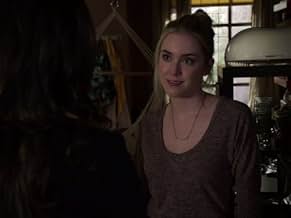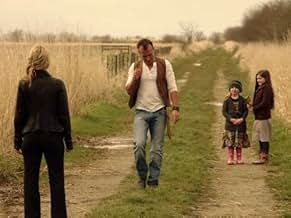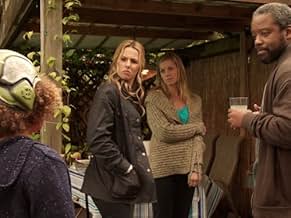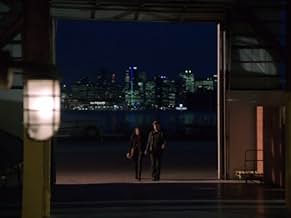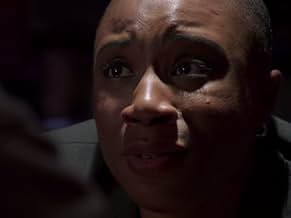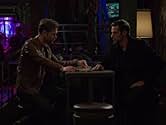Cult
- TV Series
- 2013
- 1h
IMDb RATING
6.1/10
4.6K
YOUR RATING
Tracks the investigation of a string of mysterious deaths and disappearances surrounding the show-within-a-show.Tracks the investigation of a string of mysterious deaths and disappearances surrounding the show-within-a-show.Tracks the investigation of a string of mysterious deaths and disappearances surrounding the show-within-a-show.
Browse episodes
Featured reviews
At last a series that keeps you on your toes. The first episode was slightly confusing at first but once you start to understand the show within a show format then it grabs your attention. If you have seen Cronenberg's Videodrome you will get the premise. Some elements of the show also reminded me of some of the basic elements of Twin Peaks and Lost too. My only gripe is the production values are needing a bit more polish, but that can be ignored as the story keeps things moving along nicely. It's about time we had an American series that has fantasy,dark humour and thriller aspects within the same show. The show has some real potential too. I'll be watching to see where this show goes.
"Cult" started out with a very interesting, if not completely workable, premise: the blending of the "reality" of a TV show affecting the "reality" of the universe in which that show was being filmed and broadcast. There were even hints of the "reality" of the universe in which the show (also named "Cult") affecting our actual reality in which we were watching the show "Cult". A complex, mind-bending concept and quite interesting.
Unfortunately, somewhat like "The Event" or "Flash Forward", it suffers from a couple of problems that make it virtually impossible to shape a successful series from the concept.
Compare this show's structure to something like "Supernatural" or "Doctor Who". Both have a season long story arc, like many series, but are careful to keep the arc simple (such as stop the end of the world/universe by accomplishing these specific tasks) and then feeding in the accomplishment of those required actions throughout the season. The rest of the time they are able to focus on "monster of the week" or "one off" stories, which allows a viewer the luxury of missing an episode and not feeling completely lost when they return.
"The Event", "Flash Forward" and "Cult" have a single overriding mystery driving the entire concept, set in an environment that does not lend itself to smaller, "one off" mysteries within the overall concept. In the case of "Cult", it's a reporter trying to find his missing brother who somehow got involved in the cult of "Cult". He works on no other stories and is focused entirely on this one, very complex mystery. Which means that if you miss a single episode you are completely lost, emotionally if not merely for information.
And in order to pick up the thread once more, you have to go back to the missed episode to catch up. Sometimes you have to go back a number of episodes and review them to catch the clues that will explain a later part of the series.
And in the case of a generally humor deprived universe (as in "Cult"), with little in the way of sub-plot (as in "Cult"), where the entire focus is a relentless pursuit of the mystery, there's very little but the mystery to keep you interested.
And then it isn't entertainment, it's kind of like work.
So for every viewer who misses an episode, they may very likely decide it's just not worth it to go back, that there isn't enough in each individual show to draw them back in.
That isn't to criticize the quality of the work or the premise itself. It isn't to judge the production in any way. It's just that the story structure isn't suitable to a long running series.
But for some reason producers aren't quite getting that. This should have been a mini-series, not an open ended on-going series. With a fully developed thirteen episode story it might have been brilliant. But having to keep it open ended (so there's more story to shoot episodes of once you get done with all the ones you've planned already), there just isn't enough to hold an audience.
Perhaps that's why certain universes, (hospitals, police or detectives, legal, financial and so on) make for more successful long running TV series. They contain the logical limitless range of "one off" stories that are virtually self-contained and can keep the viewer interested.
"Cult", alas, does not.
Unfortunately, somewhat like "The Event" or "Flash Forward", it suffers from a couple of problems that make it virtually impossible to shape a successful series from the concept.
Compare this show's structure to something like "Supernatural" or "Doctor Who". Both have a season long story arc, like many series, but are careful to keep the arc simple (such as stop the end of the world/universe by accomplishing these specific tasks) and then feeding in the accomplishment of those required actions throughout the season. The rest of the time they are able to focus on "monster of the week" or "one off" stories, which allows a viewer the luxury of missing an episode and not feeling completely lost when they return.
"The Event", "Flash Forward" and "Cult" have a single overriding mystery driving the entire concept, set in an environment that does not lend itself to smaller, "one off" mysteries within the overall concept. In the case of "Cult", it's a reporter trying to find his missing brother who somehow got involved in the cult of "Cult". He works on no other stories and is focused entirely on this one, very complex mystery. Which means that if you miss a single episode you are completely lost, emotionally if not merely for information.
And in order to pick up the thread once more, you have to go back to the missed episode to catch up. Sometimes you have to go back a number of episodes and review them to catch the clues that will explain a later part of the series.
And in the case of a generally humor deprived universe (as in "Cult"), with little in the way of sub-plot (as in "Cult"), where the entire focus is a relentless pursuit of the mystery, there's very little but the mystery to keep you interested.
And then it isn't entertainment, it's kind of like work.
So for every viewer who misses an episode, they may very likely decide it's just not worth it to go back, that there isn't enough in each individual show to draw them back in.
That isn't to criticize the quality of the work or the premise itself. It isn't to judge the production in any way. It's just that the story structure isn't suitable to a long running series.
But for some reason producers aren't quite getting that. This should have been a mini-series, not an open ended on-going series. With a fully developed thirteen episode story it might have been brilliant. But having to keep it open ended (so there's more story to shoot episodes of once you get done with all the ones you've planned already), there just isn't enough to hold an audience.
Perhaps that's why certain universes, (hospitals, police or detectives, legal, financial and so on) make for more successful long running TV series. They contain the logical limitless range of "one off" stories that are virtually self-contained and can keep the viewer interested.
"Cult", alas, does not.
Cult was a solid conspiracy show, which had the potential to be great. It could be great in all manners. But instead of taking the risk and create a mystic dark humored allegory about TV, Fandom and hysteria during a time where nobody can imagine where all those artificially created hypes are socially and emotionally leading people to, instead of trying to follow the potential the show's own initial plot could lead itself to, the creators decided to let the wave of the show's first arrival fade out very unspectacular.
In fact, Cult could have been so much groundbreaking, controversial, intelligent and funny in a very dark way, that it is a real shame, and also a bit unbelievable, that it truly hadn't any of those advantages at all.
I understand that the creators did try something like that, but had to handle demands for compatibility with a bigger audience. That did not go so well, because the great mystery, in time, doesn't seem that great mystery anyway, and the big conspiracy is not such a big conspiracy that keeps us interested, like in the classic X-files.
With this, the story flows gently from one small anchor point to the next, with never reaching nail-biting levels, and never being surprising, but as a solid standard riddle solving case elongated over 12 episodes, which could have taken four or five to be concluded.
And yes, everything is very serious and any humor that could save the sinking ship is absent.
The two parallel stories of Cult and "Cult in Cult" never snapped, to use a term of Cult itself, and while it is constantly told, that they do snap for the reality of the show, we were not able to believe it, they did not snap for us. We were simply not able to follow all those hidden hints.
So the show, basically imaginative, interesting and promising, drowned more or less, while fresh thought in the beginning, from lack of further imagination and plot development. It seems like the authors had lost interest in their child after they realized that they had taken the wrong path with it, and so did the audience then.
The only continuously bright spot is Robert Kneppers part in the fictional Cult Series. While it doesn't bring the show much further, it is always a fresh breeze. In fact, he is, more ore less, the main actor of both the fictional and the "real" Cult show, and he is very sardonically gifted. For him alone, the show is worth watching.
In fact, Cult could have been so much groundbreaking, controversial, intelligent and funny in a very dark way, that it is a real shame, and also a bit unbelievable, that it truly hadn't any of those advantages at all.
I understand that the creators did try something like that, but had to handle demands for compatibility with a bigger audience. That did not go so well, because the great mystery, in time, doesn't seem that great mystery anyway, and the big conspiracy is not such a big conspiracy that keeps us interested, like in the classic X-files.
With this, the story flows gently from one small anchor point to the next, with never reaching nail-biting levels, and never being surprising, but as a solid standard riddle solving case elongated over 12 episodes, which could have taken four or five to be concluded.
And yes, everything is very serious and any humor that could save the sinking ship is absent.
The two parallel stories of Cult and "Cult in Cult" never snapped, to use a term of Cult itself, and while it is constantly told, that they do snap for the reality of the show, we were not able to believe it, they did not snap for us. We were simply not able to follow all those hidden hints.
So the show, basically imaginative, interesting and promising, drowned more or less, while fresh thought in the beginning, from lack of further imagination and plot development. It seems like the authors had lost interest in their child after they realized that they had taken the wrong path with it, and so did the audience then.
The only continuously bright spot is Robert Kneppers part in the fictional Cult Series. While it doesn't bring the show much further, it is always a fresh breeze. In fact, he is, more ore less, the main actor of both the fictional and the "real" Cult show, and he is very sardonically gifted. For him alone, the show is worth watching.
Though I did find some of the concepts brought up in the series to be disappointing half circles...I was nonetheless intrigued.
The idea that television can create obsessive fans who blur reality and fiction could have been taken many places, but it was not.
Reality is a perception, however as a group humans accept the paradigm that they've been told outlines the laws of the universe as material truth. Humans will be grounded to this planet until they are able to see the current paradigm as having merely guidelines based on the current perspective. The show could have easily gone there, but it only hinted at this.
I appreciated the story line between Jeff and Skye and enjoyed watching that evolve.
The toggles between reality and fiction where mostly unsuccessful as the reality scenes were many times as Cartoony as the fiction scenes.
All in all it was worth watching, I just wanted a few more completed circles, or fleshed out ideas.
Lawna
The idea that television can create obsessive fans who blur reality and fiction could have been taken many places, but it was not.
Reality is a perception, however as a group humans accept the paradigm that they've been told outlines the laws of the universe as material truth. Humans will be grounded to this planet until they are able to see the current paradigm as having merely guidelines based on the current perspective. The show could have easily gone there, but it only hinted at this.
I appreciated the story line between Jeff and Skye and enjoyed watching that evolve.
The toggles between reality and fiction where mostly unsuccessful as the reality scenes were many times as Cartoony as the fiction scenes.
All in all it was worth watching, I just wanted a few more completed circles, or fleshed out ideas.
Lawna
10dg-pryde
I never make reviews for show... But I just had to make a review for this show. I LOVE IT! My girlfriend and I watch it every Tuesday on CW and we just keep on wondering what will be on the next weekend. I sure hope it doesn't get cancelled before the 1st season is over... I want to see it all! Love it. 10 out of 10. Very mysterious. Robert Knepper is a great actor. Love him. So is Matthew Davis. As well as Jessica Lucas... The film just makes you wonder what is going to happen next. It's almost as if it sucks you right in just like it sucks the people in that are keeping up to the show.. Not only I give it a 10 out of 10. But my girlfriend gives it a 10 out of 10. I'm the one who told her about it. Now she wants to watch it just as bad as me each week. Keep the episodes coming... No need to cancel this pilot.
Did you know
- TriviaCult was abruptly cancelled by The CW after airing 7 episodes due to poor ratings.
- How many seasons does Cult have?Powered by Alexa
Details
Contribute to this page
Suggest an edit or add missing content


